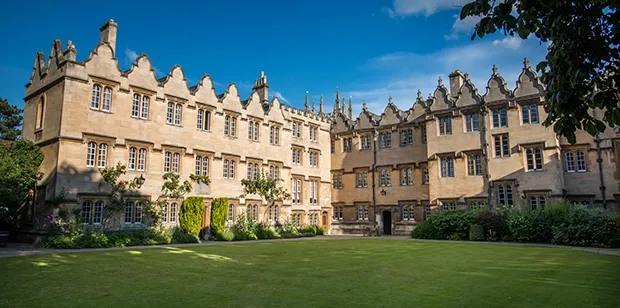
Aissa Dearing (they/she) from Durham, North Carolina, USA is a current ECM student at Oriel College. Here she answers to the most pressing questions she had when she was first considering the programme.
1. Is the ECM course hard?
Short answer: Yes.
Long answer: ECM is obviously academically challenging. Especially because at times it can be very theory-oriented. There aren’t really any easy answers to the complex issue of climate change – but I’ve learned that there shouldn’t be any easy answers. This course has helped me critically interrogate issues within the climate and environmental space, and understand the complexities and nuances of the systems we exist in. For those looking for a course more practically oriented, I think there are nuggets of wisdom that can be taken from this course, but it mainly prepares you for an academic / research-oriented career.
I think also what makes ECM so difficult is the pace of the course, and the work-life balance shift that occurs because of the demand of the coursework. It’s all about balance, balance, balance. I’ve learned that it is simply not possible to read every class text ahead of time, nor will it be possible to make every single social commitment that I’d like to. There’s always stuff going on in Oxford – whether it’s interesting lectures, a pub crawl with friends at College, a debate at the Union, or reggaeton night at the Oxford Retreat. I’ve found that even if I can’t make a certain event one week, there will likely be something cooler next week, or perhaps a similar event next term.
2. How expensive is life in Oxford?
Short answer: Quite expensive.
Long answer: It depends on your lifestyle, but Oxford holds one of the highest costs of living outside of London. There is always a shortage of student housing, so try to get into your college if you can. Meals in college halls are fairly inexpensive, and in some cases free, so try to source your meals there. Compared to the U.S., groceries are also cheaper, so if you like to cook, then it might be worth investing in kitchenware. The social scene can get quite expensive, especially if you go to the iconic pubs for drinks. There are plenty of free things to do, such as picnics, swimming at Hinksey, walks through Port Meadow – and colleges host many free events (with food!) oftentimes. Oxford doesn’t have the best secondhand market in terms of clothes and furniture, but there are many Facebook pages dedicated to re-selling and swapping that are worth checking out.

© OUImages/John Cairns Photography
3. What is the class structure like?
Short answer: In some ways more attentive, in some ways less.
Long answer: Coming from the American education system, it was truly a culture shock adjusting to the UK system. Each master’s course in SoGE is approximately 30 people, so even though it is a typical lecture-style course (as in, most content is taught in a classroom setting with a two-hour lecture) there is a lot of room for discussion and debate in the classroom. In fact, most professors encourage it. The ECM course has eight required modules:
- The Earth system – a course about the science behind climate change and its implications for policy
- Human dimensions of environmental change – all about systems-thinking, regenerative design, and environmental justice
- Global change and the biosphere – a course on ecosystem sciences, deforestation and biodiversity loss
- Economics and the environment – how market-based tools can influence policy;
- Energy systems – exactly what it sounds like
- Governance in the Anthropocene – interrogates how power asymmetries and colonial histories influence state-based governance tools
- Research methods and design – a course on different tools to use in research (we reviewed coding in R, statistics and econometrics, systems-mapping, interviews, etc. but each year is different)
- Sustainable responses to environmental change – a course on all things climate mitigation and adaptation.
In addition to these eight modules, which are taken over two terms, there are two elective classes that a student can choose from. Typically, the elective classes are taken based on one’s previously established interests and what will benefit the student most in their dissertation writing, but many students take elective courses based on new interests. Most of the electives are delivered in a discussion-based format, where the professor encourages prior reading and preparation to examine the material more thoroughly in class.
4. Who would you recommend your programme to?
Short answer: Anyone interested in climate/environmental issues!
Long answer: I think what’s really special about ECM is that it is truly diverse – requiring minimal formal background in a certain academic subject or career, just a hunger to learn more. The course is designed for people with non-science backgrounds to easily grasp scientific concepts, just as it is designed for people with non-humanities backgrounds to easily grasp different theories and frameworks. Part of the beauty of the course is learning from your course mates, with a variety of experiences and interests in different geographies. For example, my background is in African diasporic history and environmental justice, but my closest friends on the course have experience in marine sciences and blue carbon, climate communication, and energy systems engineering. I’ve learned so much just by being in conversation with them about a variety of topics discussed in the course.
5. What is the social scene like?
Short answer: Weirdly quiet on Saturdays.
Long answer: I think the short answer really captures it. There’s always stuff going on throughout the week – especially on Fridays and Sundays, but never on Saturdays. It’s kinda odd. There are really good clubs in Oxford, almost every week there are themed parties, balls, and bops hosted by different College’s Graduate student bodies, and fun mixers (such as board game parties and movie nights) for those who don’t resonate with the party environment. There is always something to do!
